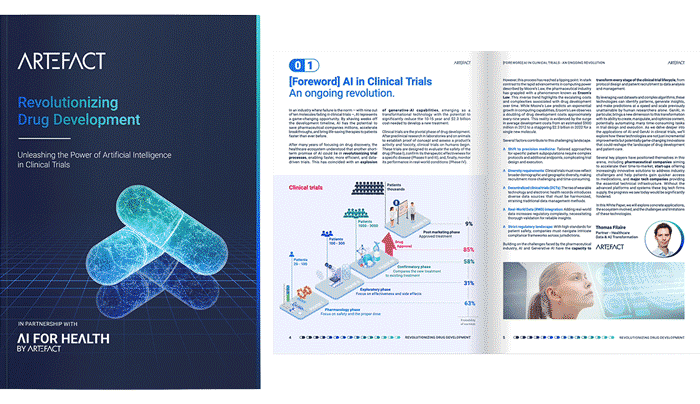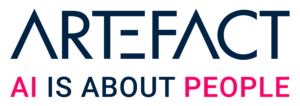A synthesis of the white paper by Artefact written in partnership with AI for Health.
Artefact’s team of experts share their field experience and precise observations through this well-documented report, rich in lessons learned and concrete use cases.
Discover thought-provoking insights from healthcare researchers, startups, pharmaceutical companies, and investors, including Servier, Pfizer, Johnson & Johnson, Google, Elaia, Inato, Klineo, Deemea, and Naaia.
Part 1. AI in Clinical Trials: An ongoing revolution
The pharmaceutical industry is undergoing a transformative shift driven by AI, which has the potential to save pharmaceutical companies millions by enabling more efficient, data-driven clinical trials. While traditional development faces escalating costs (Eroom’s Law), AI accelerates the process, reducing the average trial time significantly. Generative AI further optimizes trial design, patient recruitment, and data analysis.
Key innovations include:
“We observed a significant reduction in the average time from the start to the completion of clinical trials, decreasing from 8.6 years in 2019 to 4.8 years in 2022.”Luca Mollo, Vice-President, Medical Director France at Pfizer
Part 2. Real World Impact: Transformative Use Cases Across the Clinical Trial Value Chain
The real short-term promise of AI lies in revolutionizing processes to enable faster, more efficient, data-driven trials that can significantly accelerate the development of new therapies.
To map use cases, Artefact structured the clinical trial value chain into three key phases to provide a clear and focused framework.
Use Case #1: Clinical Trial Design
AI streamlines trial design by predicting outcomes and optimizing patient eligibility criteria. Tools like AI-powered clinical trial optimization, algorithm-based trial success prediction, and TrialGPT improve decision-making by analyzing historical data.
Impact: Data-driven trial design, faster trial protocols, enhanced patient satisfaction.
“We firmly believe in the transformation of research and clinical development through AI, having prioritized 18 R&D thematics with multiple high-potential AI use cases, ranging from target identification to trial design. This conviction will enable us to tackle the 2 major challenges of the drug innovation process: probability of success and time to market.”Brice Miranda, Group Chief Data Officer at Servier
Use Case #2: Patient Recruitment and Enrollment
AI addresses inefficiencies in recruitment, with platforms like inato expanding trial access and enhancing diversity and patient commitment. Predictive algorithms identify ideal sites for underrepresented demographics.
Impact: Recruitment time halved; diversity increased to 67% non-white participants (from 15%).
“70% of trials are concentrated in just 5% of major hospitals, while 90% of potential sites remain underutilized.”Kourosh Davarpanah, Co-founder & CEO at inato
Use Case #3: Execution and Management
AI-driven analytics automate data processing, reveal hidden patterns, and generate initial summaries that streamline the conclusion writing process. Advanced tools manage data from decentralized trials, integrating insights to accelerate conclusions. Natural Language Processing (NLP) automates reporting, reducing timelines by over 50%.
Impact: Faster regulatory approvals, lower costs, better decision-making.
“It drastically cuts report drafting time from 100 days to as little as 48 by quickly processing data, automating tasks, and generating a preliminary draft for submission to regulatory authorities.”Luca Mollo, Vice-President, Medical Director France at Pfizer
Part 3. Fueling innovation: The expanding ecosystem of AI-Driven Trials
Big Tech’s role in advancing AI-powered clinical trials
Startups and tech giants like Google and IBM are leading the charge in revolutionizing clinical trials through AI-powered tools. Notable projects include:
“We are moving away from being a reactive healthcare ecosystem to a proactive, almost predictive ecosystem.”Shweta Maniar, Global Director, Healthcare & Life Sciences at Google
How startups are driving innovation in clinical research
New players are reshaping the landscape with cutting-edge technologies and fresh approaches, addressing long standing challenges in areas like trial design, patient recruitment, data management, and trial efficiency. Notable entrants include:
“Public databases like ClinicalTrials.gov (in the US) and CTIS (in Europe) contain vast amounts of data but are often unstructured and outdated, leading to delays in finding relevant trials and thus slowing down patient recruitment.”Thomas Peyresblanques Co-founder & CEO at Klineo
Part 4. Challenges ahead: Overcoming barriers and limitations
Regulatory constraints: Ensuring patient protection while accelerating innovation
AI’s adoption in clinical trials is hindered by regulatory complexities, data interoperability issues, and the ethical concerns of bias and transparency. However, frameworks like the EU’s AI Act aim to ensure safe and high-quality applications.
“The European regulation is strict but represents an advantage as a barrier to entry for non-compliant companies.”Charlotte Pouchy, CEO at Deemea
Data access, interoperability, and synthetic data: Overcoming key challenges
In Europe, healthcare data is fragmented and inconsistent between countries, complicating AI-driven analysis. The lack of standardization across national healthcare IT systems further complicates this issue. Synthetic data offers a promising solution to address these challenges while maintaining patient privacy.
Other challenges to AI adoption in clinical trials include bias from non-representative datasets, a lack of transparency in “black box” algorithms, and heightened cybersecurity risks. Addressing these issues requires ensuring models generalize across diverse populations, enhancing explainability, and balancing robust data protection with the need for sufficient data access under strict regulatory frameworks like the EU’s AI Act and GDPR.
“The challenge of understanding and explaining decisions made by AI algorithms, along with potential bias, poses a significant hurdle for its use in clinical trials.”Nathalie Beslay, Lawyer and Co-founder & CEO of Naaia
Despite these obstacles, AI is setting a new standard for clinical research: it is not just improving trials; it’s redefining them, paving the way for faster, safer, and more patient-focused drug development that holds the potential to significantly enhance patient outcomes and advance healthcare.
Watch the conference with Luca Mollo, Vice President, Medical Director France, M.D. at Pfizer and our Artefact experts, Thomas Filaire, Partner, and Léa Giroulet, Senior Data Consultant, about the main insights from this report:

 BLOG
BLOG




